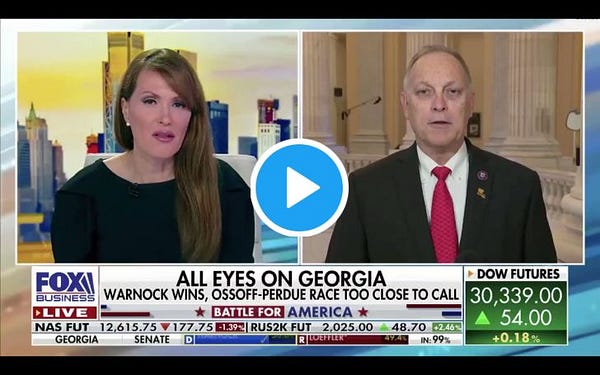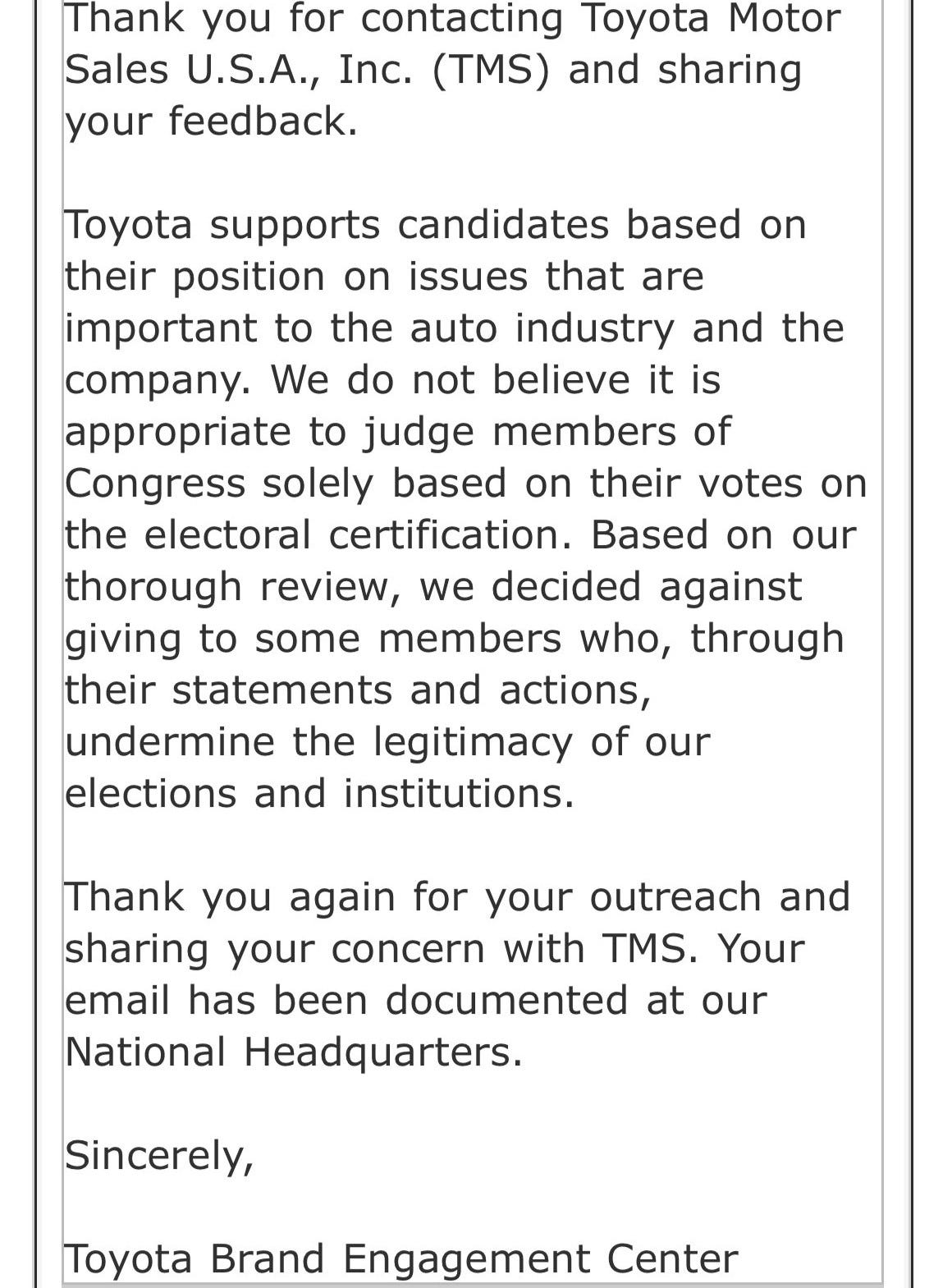After the January 6 attack on the Capitol, about 170 companies announced they were suspending donations from their corporate PACs to the 147 Republicans who voted to overturn the election results or to all members of Congress. Last Thursday, April 15, was the first major campaign finance deadline since the corporations made these pledges. All members of the House and Senate were required to report the campaign donations received over the first three months of 2021.
Popular Information reviewed the first quarter campaign finance report for every Republican objector. These filings reveal that, so far, nearly all the corporations who said they were suspending donations after January 6 have kept their word.
Further, the vast majority of other corporations — corporations who said they were reconsidering their PAC donations after January 6 or said nothing at all — withheld donations to the 147 Republican objectors. There were 1100 individual corporate PACs that donated to the 147 objectors last cycle, according to Maplight. By comparison, only around 70 individual corporate PACs contributed to the objectors in the first three months of 2021.
As a result, the Republican objectors received very little corporate PAC money. And most were not able to replace that cash with donations from individuals. For many Republicans, attempting to throw out millions of votes to bolster Trump's lies about election fraud has come with a financial price.
But the filings also revealed that there are a few corporations that are charting a very different path.
Toyota donates to dozens of Republican objectors
"Given recent events and the horrific attack on the U.S. Capitol, we are assessing our future PAC criteria," Toyota said soon after the insurrection. Within a few weeks, however, Toyota resumed donating to members of Congress that voted against certifying the Electoral College. That vote bolstered Trump's false claims of voter fraud and inspired the attack on the Capitol.
The first quarter FEC filings reveal that Toyota sent contributions to the campaigns of 39 Republicans who voted to overturn the election results. The contributions, which totaled $62,000, included some of the most bombastic members of the Republican caucus, such as Congressman Andy Biggs (R-AZ). On January 6, Biggs tweeted that he would "lead the charge" and "fight" to overturn the election results. He also promised to "produce documents" during the debate with evidence of "fraud."


Even after the insurrection, Biggs defended Trump's conduct. On February 9, Biggs insisted that Trump "did not incite a riot" and there was nothing wrong with anything Trump had said. Later that month, on February 26, Biggs received a $1,000 check from Toyota. On March 8, Toyota sent Biggs a second $1,000 check.
Why did Toyota donate to so many members who voted to overturn the election results? In an email to customers obtained by Popular Information, the company said that it "supports candidates based on their position on issues that are important to the auto industry." Toyota claimed to have undertaken a "thorough review" and "decided against giving to some members who, through their statements and actions, undermine the legitimacy of our elections and institutions."
But if a Congressman like Biggs met their criteria, it is unclear what conduct would be considered disqualifying.
In the email, Toyota also said it does "not believe it is appropriate to judge members of Congress solely based on their votes on election certification." This language was taken word-for-word from a memo issued by the U.S. Chamber of Commerce in March.
The Chamber was critical of Trump and the members of Congress who support him in the immediate aftermath of January 6. "There are some members who, by their actions will have forfeited the support of the US Chamber of Commerce. Period. Full stop," Neil Bradley, the Chamber's policy chief, said.
But in its March memo, the Chamber reversed course and suggested that funds should be withheld only from members who directly organized the activities of January 6 or pushed conspiracy theories after that date.
Going forward, the Chamber will evaluate our support for candidates – Republicans and Democrats – based on their position on issues important to the Chamber, as well as their demonstrated commitment to governing and rebuilding our democratic institutions.
We do not believe it is appropriate to judge members of Congress solely based on their votes on the electoral certification.
...casting a vote is different than organizing the rally of January 6th or continuing to push debunked conspiracy theories.
The memo attempted to recast the vote to overturn the election results as reasonable. The purpose was to provide political cover to major corporations that wish to resume donating to the group of 147 Republicans that objected to the electoral college vote. It's a perspective that Toyota embraced.
The Chamber's PAC donated to two Republican objectors in the first three months of 2021 — Congressmen Carlos Gimenez (R-FL) and Steve Chabot (R-OH).
Pfizer's "error"
After January 6, in an internal memo first reported by Popular Information, Pfizer said it "made the decision that for the next six months, Pfizer PAC will not contribute to any of the 147 Members of Congress who voted against certifying the Electoral College results after the violence that we all witnessed." After that six month period, the company said it would "review our decision and report back to you."
But on March 17, Congressman Adrian Smith (R-NE), who voted against certifying the Electoral College results, reported receiving a $2,500 donation from Pfizer.
The company did not respond to repeated requests for comment. But an email from Pfizer's investor relations department, obtained by Popular Information, says that the contribution to Smith was "made in error and has been cancelled."
Pfizer PAC supports individuals who are guided by the principles that mirror Pfizer’s core values and we continue to stand by our decision to pause Pfizer PAC contributions to all 147 Members of Congress who voted against certifying the Electoral College results. The donation to Rep. Adrian Smith was made in error and has been cancelled.
But, even if Smith's contribution is "cancelled," Pfizer has still been sending money to Republican objectors after January 6. On February 23, Pfizer donated $15,000 to the National Republican Senatorial Committee, which is run by Senator Rick Scott (R-FL), who voted against certifying the election. The funds Pfizer donated to the NRSC will also benefit other Senate Republicans who voted against certifying the electoral college, including Senator Josh Hawley (R-MO), Senator Ted Cruz (R-TX), and Senator John Kennedy (R-LA), who is up for reelection in 2022.
Cigna's bait-and-switch
On January 13, Cigna, one of the nation's largest heath insurers, issued the following statement:
There is never any justification for violence or the kind of destruction that occurred at the U.S. Capitol last week – a building that stands as a powerful symbol of the very democracy that makes our nation strong. Accordingly, CignaPAC will discontinue support of any elected official who encouraged or supported violence, or otherwise hindered a peaceful transition of power.
But in the first three months of 2021, Cigna donated to six members of Congress that hindered a peaceful transition of power by objecting to the certification of the electoral college — Congressmen Byron Donalds (R-FL), Tom Rice (R-SC), Bill Johnson (R-OH), Guy Reschenthaler (R-PA), Jodey Arrington (R-TX), and Billy Long (R-MO).
In February, Cigna also donated $15,000 to the NRSC and $15,000 the National Republican Congressional Committee (NRCC), the main fundraising vehicle for the Republican caucus of the House of Representatives. Two-thirds of House Republicans, including Republican Leader Kevin McCarthy (R-CA), voted against certifying the Electoral College on January 6.
"In January, our PAC discontinued support of any elected official that encouraged or supported violence on January 6th, and that remains true," Cigna told Popular Information last month. Notably, that statement did not mention that it also pledged to discontinue support for elected officials that "hindered a peaceful transition of power."
JetBlue reviews "political landscape," sends cash to Republican objector
After January 6, JetBlue said it had made "the decision to temporarily pause all contributions as we review the political landscape." By February, that review had concluded and JetBlue donated $1,000 to Congresswoman Nicole Malliotakis (R-NY), who voted to overturn the election result.
In a statement to Bloomberg, the company said that, in the course of its review, it "found, like the public in general, that contributors have a wide range of opinions and beliefs about current issues." In other words, the company has come to believe that voting to overturn the results of an election based on lies about voter fraud is just another "opinion."
Moving forward, JetBlue says it will donate to candidates that "have specific relevance to JetBlue’s network and business, as well as the aviation industry overall."
Koch v. Koch
The Koch political network, which is controlled by billionaire Charles Koch, issued a statement saying that the events of January 6 would "weigh heavily" on how it spends its money:
Lawmakers’ actions leading up to and during last week’s insurrection will weigh heavy in our evaluation of future support. And we will continue to look for ways to support those policymakers who reject the politics of division and work together to move our country forward
But in the first three months of 2021, Koch Industries, which is also controlled by Charles Koch, donated $17,500 to six members of congress that voted to overturn the election results — Mike Johnson (R-LA), Adrian Smith (R-NE), Ron Estes (R-KS), Glenn Thompson (R-PA), Jim Banks (R-IN), and Richard Hudson (R-NC). Koch Industries has also donated $105,000 to the NRSC in 2021.
The Alternative Path
Other companies that pledged to suspend donations to the 147 Republicans who voted to overturn the election have resumed contributing to multi-candidate committees that support some or all of those Republicans.
After January 6, Intel said, "we will not contribute to members of Congress who voted against certification of the Electoral College results as we feel that action was counter to our company's values." The company donated $15,000 to the NRCC in February. "Our policy halting direct contributions to members of Congress who voted against certification of the Electoral College results still applies," Intel said in a statement to Popular Information last month.
On January 11, AT&T said it had "decided to suspend contributions to members of Congress who voted to object to the certification of Electoral College votes this week." In February, the company donated $5,000 to the House Conservatives Fund, the Leadership PAC of Congressman Mike Johnson (R-LA), who voted against certifying the Electoral College on January 6. The House Conservative Fund also serves as the primary fundraising vehicle for the Republican Study Committee (RSC), which is comprised mostly of members of Congress who voted to overturn the election. In a statement to Popular Information in March, AT&T said the House Conservative Fund "assured" them that none of the money would go to support the re-election of members who voted to overturn the election.
The cost of voting to overturn the election
There was a financial cost for many of the Republicans who chose to validate Trump's lies about election fraud by voting to overturn the election results. Total corporate PAC donations to that group were down 80%, from $6.7 million to $1.3 million, compared to the first quarter of the 2020 cycle, according to an analysis by the Wall Street Journal.
Objectors that appear frequently in the media, like Senator Josh Hawley (R-MO) and Congresswoman Marjorie Taylor Greene (R-GA), were able to more than offset the PAC donations with small donations from the GOP base. But most Republican members of Congress were not able to replace the PAC cash. Two-thirds of the Republican objectors that had comparable data from the last cycle had "overall fundraising declines."
Members of Congress that are particularly dependent on corporate PACs experienced dramatic declines. Congressman Blaine Luetkemeyer (R-MO), for example, saw his fundraising drop from $274,000 in the first quarter of 2019 to $43,500 in the first quarter of 2021.
Whether this trend continues is an open question. Corporate lobbyists are applying "pressure to resume business as usual, particularly as the initial shock of the Capitol riot fades and the Biden administration pursues policies, like raising corporate taxes, that will give business leaders other reasons to support Republicans."





“We do not believe it is appropriate to judge members of Congress solely based on their votes on the electoral certification.”
Nothing could be further from the truth. Elected officials are (or should be) chosen on the basis of their perceived ability to exercise good judgment, NOT solely on the basis of how they approach known issues. Anyone who voted against certifying the election has demonstrated an inability to exercise good judgment that can never be overcome, no matter how much they support the auto industry.
I will NEVER buy a Toyota product.
Great job. Toyota is lower than a snake. The test is going to be tougher each subsequent quarter that nothing is done to the Congressmen who supported disallowing the electoral college. I hope Morgan Griffith and Ben Cline in VA got big hits to their campaigns.
What's in your wallet means more than they ever realized.
I just hope it can maintain til it really hurts.